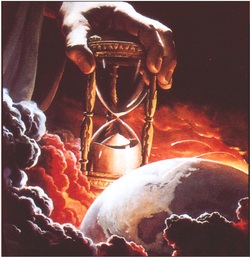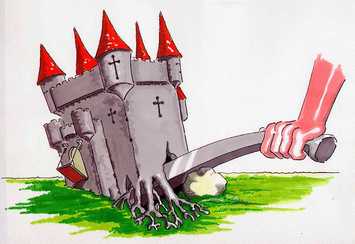Strategy: Preparing for, against and the Surprise

Surprise is what we live when we meet the unknown. When we produce surprise - unintentionally or on purpose - we cause other people to face the unexpected and its alarm. It helps to understand what we do.
You are surprised because you are hit, suddenly, by “something else”; something new, unexpected, unfamiliar, unprepared and even not yet conceivable to you.
Significant surprise is a life event.
Neglect this subject and your fate may be of the led and of the losers. Or if you surprise other people unwittingly, you will be of the clumsy unwelcome surprisers who confuse and startle people. You are well advised to avoid such useless collateral damage when you bring news and change.
The surprised - as long as they remain so - lose initiative, stumble and take hasty emotional decisions they will regret. They are slow to adapt. Their impulsive response submits them to choices crafted by other people instead of choosing with their own head. The ones skilled in surprising call the shots and gain advantage. The surprised will take as given things they should think over with prudence.
Being surprised is a situation of temporary inferiority: judgement is impaired, errors often made, opportunities lost and - as an additional damage - bad relationships created unwillingly.
We need an education for surprise and we had none. We need a Pragmatic of Surprise, a practical method fit to deal with the unknown as it is lived by us, but there is none. For a start, we need to understand more about this state of mind we call surprise.
Modern schooling is about what was known before, what can be measured and foreseen, not about negatives like uncertainty, hazard and the unknown. The truth that potentialities are endless is too complicated for the classroom. Our methods and standard recipes do not teach us how to deal with the unfamiliar as such, instead they are meant to reduce the unknown to the known. We are thought some solutions to the known problems. Instruction works to eliminate surprise from our life; it aims to foresee everything and plan to prevent disorder. In fact, most human endeavour is to keep the world under control.
We are not formally educated for the unplanned side of life. Meanwhile, disorder and unexpected newness is all around us, a multitude that cannot be reduced. With people prejudiced to reduce the unknown into something habitual, surprises appear as noise, accident or error, given by the inevitable complexity of the Universe if not by Fate. What else to do with the unexpected than to avoid it or suffer it?
I claim that we can do much better: certainly,we can prepare against surprise, but also for surprise and we can even devise the surprise ourselves.
James Carse pointed at the solution some time ago: "To be prepared against surprise is to be trained. To be prepared for surprise is to be educated." [1]
*
Preparing against surprise

Normally, people shield against surprise by instruction and prudent foresight: we learn the explanations, what to do and what not; we buy insurance against accidents; we make reserves; we watch our step; we plan in detail what we will do, where and when; we avoid the unknown. We do less to risk less: "Deep in the sea, you find riches beyond compare. But if it’s safety you seek, it’s on the shore.”
Preparing against surprise is the core of human science and business and mainstream warfare. It is another wording for knowing the world and planning to succeed. Such understanding belongs to the traditional field of strategy and follows a general model: investigate, analyse, extract rules, decide, plan and carry out the plan. And of course, amass ressource and sheer force to do it.
However, it appears that most people do not have a habit to imagine at the same time several courses of events with many branching possibilities; even less can they reshape and to adapt continuously the possible flow of such branching while they follow a plan; how to concentrate attention on such vague and volatile things? Therefore, the majority of people do not prepare even against foreseeable surprise. Building fortifications or buying insurance is cheaper than self-reliance.
*
Preparing against surprise is the core of human science and business and mainstream warfare. It is another wording for knowing the world and planning to succeed. Such understanding belongs to the traditional field of strategy and follows a general model: investigate, analyse, extract rules, decide, plan and carry out the plan. And of course, amass ressource and sheer force to do it.
However, it appears that most people do not have a habit to imagine at the same time several courses of events with many branching possibilities; even less can they reshape and to adapt continuously the possible flow of such branching while they follow a plan; how to concentrate attention on such vague and volatile things? Therefore, the majority of people do not prepare even against foreseeable surprise. Building fortifications or buying insurance is cheaper than self-reliance.
*

The worst I saw in fighting surprise is people resolving and planning in detail all they will do, where and even when and following firmly. Make it or break it, with no compromise.
This is - it seems - a samurai approach that reads very much like my favourite Charles the Bold's resilience adage adapted to robots: “It is not necessary to hope in order to undertake, nor to succeed in order to persevere.”
According to the Bushido, the samurai wakes up in the morning, cleans himself and his sword carefully, dresses his best garment and says, “This is the day when I will die”. With these words, all metaphysical hesitation is ended for the day. One is ready for the worst. When suddenly attacked, the samurai will “function” optimally following his well-defined duty. He knows in advance what to observe and do promptly. It will be attack by one, two, three or many. It will be with slashing, stabbing, burning, striking and so on. It must be frontal, lateral, from behind, downwards, on the low line, waistline, and chest or head level. He does not have to win or survive, just to do the right thing. No surprise, do your duty and your best, promptly, with perfect positions, riposte and attack. [2]
Such may be a way to live in adverse times, if your values and your work are worth to you more than your life. Luckily, there are less destructive stratagems against the unexpected.
 Thinking-it-over-J-G Brown (1889) Source wikigallery org non commercial 2015
Thinking-it-over-J-G Brown (1889) Source wikigallery org non commercial 2015
You can prepare against surprise with simple actions, even without understanding in depth how it works, as long as you accept the common sense wisdom that surprises do happen and if you care to consider from where they are likely to come in your situation.
Often it is sufficient to take a moment, give a thought to what could happen. Our mind can be amazing at that. We can also research or ask somebody better informed and listen to what they say. Do we?
The wisest thing you could do, is to form a habit to list the surprises you guess likely to happen whenever you start something and to consider what you do about them. Or what you should absolutely not do. Did you observe many people doing it?
To list surprises you need to imagine them first; for this, do not take your imagination for real but do not silence her as most people learn to do. Let her roam. Do not keep too busy to think. Take time to dream ahead.
If the occasion is important, take a pen and write down your brainstorming, discuss it with trusted people; think out what you should do if it happens.
Often it is sufficient to take a moment, give a thought to what could happen. Our mind can be amazing at that. We can also research or ask somebody better informed and listen to what they say. Do we?
The wisest thing you could do, is to form a habit to list the surprises you guess likely to happen whenever you start something and to consider what you do about them. Or what you should absolutely not do. Did you observe many people doing it?
To list surprises you need to imagine them first; for this, do not take your imagination for real but do not silence her as most people learn to do. Let her roam. Do not keep too busy to think. Take time to dream ahead.
If the occasion is important, take a pen and write down your brainstorming, discuss it with trusted people; think out what you should do if it happens.
*
The more you learn, the more experience you gather, the least you are surprised. Or is it so?
The more you learn, the more experience you gather, the least you are surprised. Or is it so?

Once you anticipated a probable surprise, you have advantage only if do something about it!
Unfortunately, even when several likely surprises are known, imminent, a matter of when rather than a matter of if, many people I know respond in a way I call “waiting to be hit by a slow moving truck”; they do nothing, to the last second. In this way they get surprised, unprepared in spite of knowing in advance what will happen.
*
Finally, if you had no time or care to imagine, predict or foresee, you may at least refrain from neglecting the actual early warning signs of coming events; I am sad to write that most people excel at keeping blind to unpleasant omens and signals. The myth of Cassandra's, the daughter of Priam's curse to prophecy the destruction of Troy but never to be believed reflects a widely suffered impairment in mankind. Maybe you will decide to consider warning signs as part of reality.
Unfortunately, even when several likely surprises are known, imminent, a matter of when rather than a matter of if, many people I know respond in a way I call “waiting to be hit by a slow moving truck”; they do nothing, to the last second. In this way they get surprised, unprepared in spite of knowing in advance what will happen.
*
Finally, if you had no time or care to imagine, predict or foresee, you may at least refrain from neglecting the actual early warning signs of coming events; I am sad to write that most people excel at keeping blind to unpleasant omens and signals. The myth of Cassandra's, the daughter of Priam's curse to prophecy the destruction of Troy but never to be believed reflects a widely suffered impairment in mankind. Maybe you will decide to consider warning signs as part of reality.
Preparing for surprise

Quietly, ready for surprise. CC M. Janich
Suppose you are that prudent person who prepares wisely against all kinds of risk.
You will still be surprised sometimes. The unexpected happens.
Someone prepared not only against surprise but additionally, for surprise will be unsettled, will feel it no doubt but will be less confused, with an optimal chance to do the right thing, seize opportunity and face threat.
Common preparation for surprise is an attitude of reason, or a stoic acceptance, a state of mind of expecting surprises as inevitable, thus being ready, mentally and emotionally to act instead of overacting.
As if in difficult times you started each morning curious to see “what will be the surprise of the day?” instead of hoping there was no surprise for you and hating in advance to have something new happening. This attitude keeps one ready to do their best whatever happened.
A small number of people appear naturally gifted to live well the unforeseen. They, navigate smoothly, sense instantly, judge on their feet, adapt and improvise. Some are eager to meet the adventure, the excitement, the benefits and opportunities, ready to fence with threat and to use events with protean art while "going seamlessly with the flow". They are the kind of people speaking about "Change" as both danger ans opportunity. This style can also be learned, to some extent - as a combative attitude or on the contrary, a mental attitude of lightness, as some Taoist thinkers and strategists practice it.
A part of an education for surprise is to prepare mentally to learn from each surprise you live, to always "debrief", not forgetting what you did wrong when you were startled before, learning purposefully from the errors made and deciding each time what and how to do better if the same thing happened again or at the next "totally new"surprise.
Preparing for surprise consists in increasing your readiness to meet the unexpected and the unknown in general, to make sense of it fast, and deal with it optimally.
*
Preparing for surprise improves with knowing which aspect is constant across a multitude of various unique surprises. That similar part is the sequence of your response. Hard realities of what I would call steel, money, blood, accident are out of your control, but you can be aware and master the way you respond to them and particularly to other people's response to them. You can optimise your conduct under surprise.
What makes your (and other people’s or groups’) surprise governable is that it follows a pattern hard-wired in our biology:
First, you do not perceive that a surprise situation started and what it means, it comes too quick or too slow, too small or too big, too unimportant or too important to be grasped.
Next, you are taken, you fall into the surprise state. You do not understand what happens, you are confused.
Then, inevitably, you hate it. All circuits fire up in survival alarm! Adrenaline bursts. We have a first dislike even of good surprise. We are as our lizard ancestors were, against any sudden change because it probably meant danger and death.
The hostile response is spontaneous fight or spontaneous flight; if it is small, smash it or devour it! If it is big, flee! If you cannot flee, play dead! This is quicker and stronger than thinking.
This surge takes its time, which I observed constant for typical kinds of situations: seconds, usually minutes for individuals in everyday circumstances and much more in interpersonal and group situations, time multiplied with the number of people involved and the dimension or the strangeness of the event. I observed repeatedly that groups of people have the same response pattern as each component individual but it is much slower and less rational; the lager the group, the slower the waking up from the newness-hostility sway. While some individuals wake up to reason, the group pulls them back down.
Large groups, crowds and whole nations seem to be the worst in their startle response to unexpected newness. Such moments are the ideal occasion for the human beast to surface and for manipulators to grab power and obtain popular vote. Leaders able to make crowds think and judge newness reasonably must be great indeed. (But they can take effective action if they understand what happens.)
Finally, after a necessary cooling while, the indispensable lapse of time hopefully passed, the human being becomes rational again. Persons are able anew to judge to their best (but not better). Now we can listen to facts and explanations, to reason, to best interest and calls to being reasonable or just. By then, surprise became what it's substance is in fact – a problem or an opportunity.
*
If you understood how surprise works you can do the following while it happens to you, instead of just suffering it:
You will still be surprised sometimes. The unexpected happens.
Someone prepared not only against surprise but additionally, for surprise will be unsettled, will feel it no doubt but will be less confused, with an optimal chance to do the right thing, seize opportunity and face threat.
Common preparation for surprise is an attitude of reason, or a stoic acceptance, a state of mind of expecting surprises as inevitable, thus being ready, mentally and emotionally to act instead of overacting.
As if in difficult times you started each morning curious to see “what will be the surprise of the day?” instead of hoping there was no surprise for you and hating in advance to have something new happening. This attitude keeps one ready to do their best whatever happened.
A small number of people appear naturally gifted to live well the unforeseen. They, navigate smoothly, sense instantly, judge on their feet, adapt and improvise. Some are eager to meet the adventure, the excitement, the benefits and opportunities, ready to fence with threat and to use events with protean art while "going seamlessly with the flow". They are the kind of people speaking about "Change" as both danger ans opportunity. This style can also be learned, to some extent - as a combative attitude or on the contrary, a mental attitude of lightness, as some Taoist thinkers and strategists practice it.
A part of an education for surprise is to prepare mentally to learn from each surprise you live, to always "debrief", not forgetting what you did wrong when you were startled before, learning purposefully from the errors made and deciding each time what and how to do better if the same thing happened again or at the next "totally new"surprise.
Preparing for surprise consists in increasing your readiness to meet the unexpected and the unknown in general, to make sense of it fast, and deal with it optimally.
*
Preparing for surprise improves with knowing which aspect is constant across a multitude of various unique surprises. That similar part is the sequence of your response. Hard realities of what I would call steel, money, blood, accident are out of your control, but you can be aware and master the way you respond to them and particularly to other people's response to them. You can optimise your conduct under surprise.
What makes your (and other people’s or groups’) surprise governable is that it follows a pattern hard-wired in our biology:
First, you do not perceive that a surprise situation started and what it means, it comes too quick or too slow, too small or too big, too unimportant or too important to be grasped.
Next, you are taken, you fall into the surprise state. You do not understand what happens, you are confused.
Then, inevitably, you hate it. All circuits fire up in survival alarm! Adrenaline bursts. We have a first dislike even of good surprise. We are as our lizard ancestors were, against any sudden change because it probably meant danger and death.
The hostile response is spontaneous fight or spontaneous flight; if it is small, smash it or devour it! If it is big, flee! If you cannot flee, play dead! This is quicker and stronger than thinking.
This surge takes its time, which I observed constant for typical kinds of situations: seconds, usually minutes for individuals in everyday circumstances and much more in interpersonal and group situations, time multiplied with the number of people involved and the dimension or the strangeness of the event. I observed repeatedly that groups of people have the same response pattern as each component individual but it is much slower and less rational; the lager the group, the slower the waking up from the newness-hostility sway. While some individuals wake up to reason, the group pulls them back down.
Large groups, crowds and whole nations seem to be the worst in their startle response to unexpected newness. Such moments are the ideal occasion for the human beast to surface and for manipulators to grab power and obtain popular vote. Leaders able to make crowds think and judge newness reasonably must be great indeed. (But they can take effective action if they understand what happens.)
Finally, after a necessary cooling while, the indispensable lapse of time hopefully passed, the human being becomes rational again. Persons are able anew to judge to their best (but not better). Now we can listen to facts and explanations, to reason, to best interest and calls to being reasonable or just. By then, surprise became what it's substance is in fact – a problem or an opportunity.
*
If you understood how surprise works you can do the following while it happens to you, instead of just suffering it:

Tummy ache symptom. CC W. Sauber
First, observe that you are surprised.
You may ask how to do this.
It is easy, you feel discomfort. Stress. I like to call this symptom, with humour, the Epistemic Detector i.e. that weird sensation you have in the stomach, or elsewhere.
Instead of trying to ignore it, notice, trust your common sense, listen to the message: “Attention, something unexpected, start the surprise procedure!”
*
You may ask how to do this.
It is easy, you feel discomfort. Stress. I like to call this symptom, with humour, the Epistemic Detector i.e. that weird sensation you have in the stomach, or elsewhere.
Instead of trying to ignore it, notice, trust your common sense, listen to the message: “Attention, something unexpected, start the surprise procedure!”
*

Hourglas from the skies, CC Skeeterwiz34
The second thing you must do, is to wait and gain time to wake up; no hard decisions on the spot, do not do, do not say things while confused or hostile – you know and must consider that you are under pressure and biased. Your judgement may be poor.
Avoid responding (acceptance or rejection are equally inadequate) or committing, as you are possibly played by the surpriser. Do not declare and sign things. Do not explain.
In short, it is now urgent to wait.
Use the means you have at hand to gain time; ask for a break, say “let me think”, “I must consult”. Do not pledge to anything! One of my favourite ways is to exclaim with candour: “Oh, I’m surprised! This is important, I continue, not to take lightly, I need to think! Let’s speak soon, later. Let’s take a break...” Break for a coffee. Leave for some simple reason. Feign something. If needed, faint; learn from the bugs in danger who play dead.
If you expect to be surprised, in a negotiation or some other complicated action, prepare and take with you someone who has the task to observe, to take over from you instantly and play the ball neutrally, without committing, until you come back to full control. Then, when you recovered, take over again.
Remember however that everybody else involved – except the surpriser, maybe – is also surprised, in the same state. They suffer a similar dysfunction and need of a break. You must attend to this, particularly when you are the one who brings the surprise. Do not be of that sorry breed of messengers who gather a crowd, break bad news to them and expect things to evolve in a reasonable direction.
Finally, enter a phase of reason. After the necessary lapse of time, when you and other people involved woke up and use reason again, try to repair the possible errors made while you were surprised. Now you can re-define the situation, excuse yourself if needed, appeal to reason and reasonableness and find practical solutions.
*
Avoid responding (acceptance or rejection are equally inadequate) or committing, as you are possibly played by the surpriser. Do not declare and sign things. Do not explain.
In short, it is now urgent to wait.
Use the means you have at hand to gain time; ask for a break, say “let me think”, “I must consult”. Do not pledge to anything! One of my favourite ways is to exclaim with candour: “Oh, I’m surprised! This is important, I continue, not to take lightly, I need to think! Let’s speak soon, later. Let’s take a break...” Break for a coffee. Leave for some simple reason. Feign something. If needed, faint; learn from the bugs in danger who play dead.
If you expect to be surprised, in a negotiation or some other complicated action, prepare and take with you someone who has the task to observe, to take over from you instantly and play the ball neutrally, without committing, until you come back to full control. Then, when you recovered, take over again.
Remember however that everybody else involved – except the surpriser, maybe – is also surprised, in the same state. They suffer a similar dysfunction and need of a break. You must attend to this, particularly when you are the one who brings the surprise. Do not be of that sorry breed of messengers who gather a crowd, break bad news to them and expect things to evolve in a reasonable direction.
Finally, enter a phase of reason. After the necessary lapse of time, when you and other people involved woke up and use reason again, try to repair the possible errors made while you were surprised. Now you can re-define the situation, excuse yourself if needed, appeal to reason and reasonableness and find practical solutions.
*
Here are a few things you can do in the long term to educate yourself for surprise:
Consider and accept that you cannot control and plan everything.
Accept that surprises are inevitable in your life, become prepared in your soul and attitude that surprise will happen to you and everybody else. When it does it depends on you whether you optimise or worsen the situation. Let me repeat, you need to be armed with knowing that when surprised, you are often weakened in your judgment and response. It helps spectacularly to resolve that in most surprise-situations it is urgent to wait and gain time to recover.
Grow the openness and tolerance of your mind to the unknown. The more general culture, good books read, people and situations met, the richer your life experience give you more choice and readiness in the mind to meet newness. A habit of not needing (compulsively or by method) to know everything also preserves you from many surprises. Instead of being defensive against the unfamiliar you will say: “Aha, yet another thing I did not know about!” The curious are less often surprised than the sufficient.
To avoid quick choices under pressure, learn to apply constantly the principle that there are always choices of choices beyond the choice presented to you quickly and it is your freedom do establish which they are.
Observe whenever you have an occasion people and groups surprised. Try to take a distance or at least to reflect after the fact to how they reacted and how they evolved and to what result. Compare them with that which your common sense considers reasonable.
Exercise with surprises, as you exercise riding a bicycle, through games and safe occasions, until you become familiar with unbalance, uncertainty, transience, acceptant of ambiguity, disorder and the like ingredients of change so that you gain self-confidence for more critical situations.
Consider and accept that you cannot control and plan everything.
Accept that surprises are inevitable in your life, become prepared in your soul and attitude that surprise will happen to you and everybody else. When it does it depends on you whether you optimise or worsen the situation. Let me repeat, you need to be armed with knowing that when surprised, you are often weakened in your judgment and response. It helps spectacularly to resolve that in most surprise-situations it is urgent to wait and gain time to recover.
Grow the openness and tolerance of your mind to the unknown. The more general culture, good books read, people and situations met, the richer your life experience give you more choice and readiness in the mind to meet newness. A habit of not needing (compulsively or by method) to know everything also preserves you from many surprises. Instead of being defensive against the unfamiliar you will say: “Aha, yet another thing I did not know about!” The curious are less often surprised than the sufficient.
To avoid quick choices under pressure, learn to apply constantly the principle that there are always choices of choices beyond the choice presented to you quickly and it is your freedom do establish which they are.
Observe whenever you have an occasion people and groups surprised. Try to take a distance or at least to reflect after the fact to how they reacted and how they evolved and to what result. Compare them with that which your common sense considers reasonable.
Exercise with surprises, as you exercise riding a bicycle, through games and safe occasions, until you become familiar with unbalance, uncertainty, transience, acceptant of ambiguity, disorder and the like ingredients of change so that you gain self-confidence for more critical situations.

Role-play surprise to become accustomed with it. Train the mind and the skill of behaving optimally in critical situations. A classical Zen story explains this sort of education:
The son of a thief saw his father growing older and decided to start helping him. “If you become too old, I will have to be the breadwinner of the family. Teach me to steal, if you please.”
The old thief took him the same night to rob a rich house.
Father cut a hole in the fence and they tiptoed into the house. He opened a large chest and pointed his son to go inside and look for jewels. As soon as the young man got in, the thief shut the lid, locked it, and left, throwing a stone in the courtyard to wake up the family while he quietly slipped away through the fence. The people of the house lighted candles but found nothing. The son froze frightened, confined in the chest. After a while, as his heartbeat decreased but his despair grew, he had an idea. He scratched the wood to imitate the gnawing of a mouse. The family told a maid to take a candle and look into the chest. Once the lid unlocked the captive leaped out, blew out the light and fled. Everybody caught arms and ran after him. The boy ran for his life. Through the bushes, the party was getting closer. Then he saw a well. He threw in a boulder and hid in the thicket. As his hunters lost time to fish out his drowned body the boy crawled away and got safely to his house. His father looked at him with curiosity and asked him how he got off. “Why did you act so cruelly?” reproached the son. “Well my son, isn’t this what you wanted? Here you are, now you learned the art of burglary.”[3]
Develop a style and collect a number of skilled tactics, ready to use. In your work and among people, set up organization structures and roles, “fire-fighters” ready for response and management of surprise. Have some light cavalry ready and empowered.
Preparing for surprise means also forming a habit to travel light. Own less. Reduce the furniture and the luggage. Leave space to turn. In times where you expect big surprise, keep your belongings lean with few obligations, knots and ties, low break even, minimal sunk costs and low exit barriers. When you expect to encounter the wild boar do not tie your dog to your wrist. Having less to loose is a strong preparation for bad surprise.
The son of a thief saw his father growing older and decided to start helping him. “If you become too old, I will have to be the breadwinner of the family. Teach me to steal, if you please.”
The old thief took him the same night to rob a rich house.
Father cut a hole in the fence and they tiptoed into the house. He opened a large chest and pointed his son to go inside and look for jewels. As soon as the young man got in, the thief shut the lid, locked it, and left, throwing a stone in the courtyard to wake up the family while he quietly slipped away through the fence. The people of the house lighted candles but found nothing. The son froze frightened, confined in the chest. After a while, as his heartbeat decreased but his despair grew, he had an idea. He scratched the wood to imitate the gnawing of a mouse. The family told a maid to take a candle and look into the chest. Once the lid unlocked the captive leaped out, blew out the light and fled. Everybody caught arms and ran after him. The boy ran for his life. Through the bushes, the party was getting closer. Then he saw a well. He threw in a boulder and hid in the thicket. As his hunters lost time to fish out his drowned body the boy crawled away and got safely to his house. His father looked at him with curiosity and asked him how he got off. “Why did you act so cruelly?” reproached the son. “Well my son, isn’t this what you wanted? Here you are, now you learned the art of burglary.”[3]
Develop a style and collect a number of skilled tactics, ready to use. In your work and among people, set up organization structures and roles, “fire-fighters” ready for response and management of surprise. Have some light cavalry ready and empowered.
Preparing for surprise means also forming a habit to travel light. Own less. Reduce the furniture and the luggage. Leave space to turn. In times where you expect big surprise, keep your belongings lean with few obligations, knots and ties, low break even, minimal sunk costs and low exit barriers. When you expect to encounter the wild boar do not tie your dog to your wrist. Having less to loose is a strong preparation for bad surprise.

What counts most and prepares you best to meet surprise is to be clear in your mind, beyond deliberation, of what is important for you in any changing conditions. What I called “The strategy of the cork” is the best weapon I know against stormy wheather.
When he water rises, so does the boat.
"Calm is nothing more than being prepared for anything, and so when it does come there is no shock at all." [3a]
*
Preparing the surprise

Finally, as surprise is so powerful among people, why not learn to create it, or use it instead of just receiving it?
The art of preparing the surprise is the poise between surprising and not surprising. You master surprise by not producing it when it is unintended or by creating it when it serves.
A first way of using surprise is thus to learn how avoid it.
You can avoid surprising other people as you avoid startling other drivers on the highway by not doing things unexpected.
Sometimes you must however bring surprising newness to people you want to help, to make change succeed. You may have new ideas, inventions, innovations, you discovered new truth; being pulled out of a whole or into a much larger box is shocking. Use what you know about preparing against and for surprise to avoid the known reaction, or at least to prepare people for it, to provide time for the surprise flow to become rational.
If you want to avoid the "built-in" negative reaction of people being surprised with something new, make a rule of being slow, easily foreseeable, with many warnings.
Do not start where you are, do not start where the newness is - far ahead, but where people are. Start always from the people towards the newness and not from the unknown towards the people. Start with the understood, the usual and the accepted.
To cushion surprise follow well-known and familiar patterns, plan steps and rituals of passage to reassure. The newer the content, the older the form! Rituals mark and legitimise radical change - something that ends and something else that begins. Everybody has a role to play and a place granted. Rituals allow people to stop being who they were and become somebody else without tragedy.
*
On the contrary, you may want to produce surprise to seize initiative, to unhorse and baffle adversaries, against competitors or to unfreeze the convictions of friends so that they become able to consider something different.
There are many simple ways to surprise, even my dog Cash knows some, when she jumps into the grass to scare and to rise the hidden mice. Sudden more or less of the same, whatever contrary to expectations, a louder noise, something to stumble upon, a hasty turn will do. However, producing surprise can be a higher order matter of strategy.
My recipe is this: to surprise people, start suddenly where they are not, where their mind did not reach. It is probably the meaning of Sun-Tzu’s maxim: “To be certain to take what you attack, is to attack a place the enemy does not protect.” [4]
The art of preparing the surprise is the poise between surprising and not surprising. You master surprise by not producing it when it is unintended or by creating it when it serves.
A first way of using surprise is thus to learn how avoid it.
You can avoid surprising other people as you avoid startling other drivers on the highway by not doing things unexpected.
Sometimes you must however bring surprising newness to people you want to help, to make change succeed. You may have new ideas, inventions, innovations, you discovered new truth; being pulled out of a whole or into a much larger box is shocking. Use what you know about preparing against and for surprise to avoid the known reaction, or at least to prepare people for it, to provide time for the surprise flow to become rational.
If you want to avoid the "built-in" negative reaction of people being surprised with something new, make a rule of being slow, easily foreseeable, with many warnings.
Do not start where you are, do not start where the newness is - far ahead, but where people are. Start always from the people towards the newness and not from the unknown towards the people. Start with the understood, the usual and the accepted.
To cushion surprise follow well-known and familiar patterns, plan steps and rituals of passage to reassure. The newer the content, the older the form! Rituals mark and legitimise radical change - something that ends and something else that begins. Everybody has a role to play and a place granted. Rituals allow people to stop being who they were and become somebody else without tragedy.
*
On the contrary, you may want to produce surprise to seize initiative, to unhorse and baffle adversaries, against competitors or to unfreeze the convictions of friends so that they become able to consider something different.
There are many simple ways to surprise, even my dog Cash knows some, when she jumps into the grass to scare and to rise the hidden mice. Sudden more or less of the same, whatever contrary to expectations, a louder noise, something to stumble upon, a hasty turn will do. However, producing surprise can be a higher order matter of strategy.
My recipe is this: to surprise people, start suddenly where they are not, where their mind did not reach. It is probably the meaning of Sun-Tzu’s maxim: “To be certain to take what you attack, is to attack a place the enemy does not protect.” [4]

In order to surprise, break rules and jump out of usual patterns. Make new rules! Trespass! Change frames!
Remember the Norbert Wiener anecdote about how a mongoose surprises the cobra: first establish a regular pattern of “dance”, and then, when the pattern is instituted, jump suddenly out of the routine[5].

The magic formula for producing unexpected newness is the n±1 strategy.
Question and challenge the obvious at the root! Question the axioms! That will surprise.
Challenge unquestioned beliefs and expectations.
Use paradox!
Change aims, suddenly.
Change the context.
Change definitions, references and meanings.
Change the participants to the play, the level where it happens, higher or lower.
Interrupt and leave something unfinished. All this guarantees surprise.
*
Surprise is the substance of all strategies. Having the initiative of change is a strategic advantage. In one way or another all strategies work to prevent, steer or originate unexpected change.
To quote from a previous essay of mine [6], “The subject of all strategies is change. When we look at examples of strategies in history, games and daily life, we find one thing in common in all these: thriving to control what will occur. Try to find something that we want to control and which is not the course of change - "what we will do and what will happen". If you scratch the surface, the subject of any strategy is Change...
In conflict or competition, some want to carry through the expected while keeping out the unexpected. Others want to catch their enemies unawares with the unexpected.
The deepest common denominator in all "strategic" enterprises - military, business, scientific or personal - is to avoid, prevent, exploit or bring unexpected change. I would redefine Strategy as the effort to manage the course of change. Strategy is a form of creative thinking - intelligent will, opening unexpected choices. The specific difference that makes thinking strategic is systematic wider view, pragmatism and creative freedom in rule breaking and making. Creative strategy adds to logical analysis and planning the ability to consider the unknown and create that, which was not given.
Creating unanticipated change includes winning against competitors or adversary players yet it is much wider in scope. Pioneers, inventors, artists and thinkers, some of the most influential personalities in history, wander and surprise the world. Some people are strategic in changing the course of history. They invent new objects and new meaning and add their creations to the world we live in. As Napoleon liked to say, "the greatest improvisation of the human mind is that which gives existence to the nonexistence" [7]. This is a strategy of surprise, indeed.”
© 2011, 2012 Ioan Tenner & Daniel Tenner
Question and challenge the obvious at the root! Question the axioms! That will surprise.
Challenge unquestioned beliefs and expectations.
Use paradox!
Change aims, suddenly.
Change the context.
Change definitions, references and meanings.
Change the participants to the play, the level where it happens, higher or lower.
Interrupt and leave something unfinished. All this guarantees surprise.
*
Surprise is the substance of all strategies. Having the initiative of change is a strategic advantage. In one way or another all strategies work to prevent, steer or originate unexpected change.
To quote from a previous essay of mine [6], “The subject of all strategies is change. When we look at examples of strategies in history, games and daily life, we find one thing in common in all these: thriving to control what will occur. Try to find something that we want to control and which is not the course of change - "what we will do and what will happen". If you scratch the surface, the subject of any strategy is Change...
In conflict or competition, some want to carry through the expected while keeping out the unexpected. Others want to catch their enemies unawares with the unexpected.
The deepest common denominator in all "strategic" enterprises - military, business, scientific or personal - is to avoid, prevent, exploit or bring unexpected change. I would redefine Strategy as the effort to manage the course of change. Strategy is a form of creative thinking - intelligent will, opening unexpected choices. The specific difference that makes thinking strategic is systematic wider view, pragmatism and creative freedom in rule breaking and making. Creative strategy adds to logical analysis and planning the ability to consider the unknown and create that, which was not given.
Creating unanticipated change includes winning against competitors or adversary players yet it is much wider in scope. Pioneers, inventors, artists and thinkers, some of the most influential personalities in history, wander and surprise the world. Some people are strategic in changing the course of history. They invent new objects and new meaning and add their creations to the world we live in. As Napoleon liked to say, "the greatest improvisation of the human mind is that which gives existence to the nonexistence" [7]. This is a strategy of surprise, indeed.”
© 2011, 2012 Ioan Tenner & Daniel Tenner
_______________________
[1] Carse, J.P., “Finite and Infinite Games”, The Free Press, New York, 1986
[2]( After Yamamoto Tsunetomo, Hagakure -The Way of the Samurai ...)
[3] Suzuki, Daisetz, Zen and Japanese Buddhism, Japan Travel Bureau, Tokyo, 1973, pp. 66-67
[3a] Thomas Mann, Joseph and His Brothers, Alfred A. Knopf, New York.., 2005, p. 1118
[4] Sun Tzu, The Art of War, tr, Griffith S.B., Oxford U.P., 1971, p 96
[5] Wiener Norbert, Cybernetics, MIT Press, 1971, p.174 (inspired by Kipling’s Rikky-Tikky Tavi)
[6] Strategy. The Art of the General, 1997. This essay, written in 1997 was not published and I lost everything but my notes. It was a time when I was surprised.
[7] Napoleon, conversation in the early 1800's, quoted in Christopher Harold, ed., The Mind of Napoleon, 1955, cf. Tsouras, P., G., The Book of Military Quotations, Zenith Press, St. Paul 2005 p. 279
The whole quote is: Military science consists in first calculating all the possibilities accurately and then in making an almost mathematically exact allowance for accident. It is on this point that one must make no
mistake; a decimal more or less may alter everything. Now. this apportioning of knowledge and accident can take place only in the head of a genius, for without it there can be no creation - and surely the greatest improvisation of the human mind is that which gives existence to the nonexistent. Accident thus always remains a mystery to mediocre minds and becomes reality for superior men.
[1] Carse, J.P., “Finite and Infinite Games”, The Free Press, New York, 1986
[2]( After Yamamoto Tsunetomo, Hagakure -The Way of the Samurai ...)
[3] Suzuki, Daisetz, Zen and Japanese Buddhism, Japan Travel Bureau, Tokyo, 1973, pp. 66-67
[3a] Thomas Mann, Joseph and His Brothers, Alfred A. Knopf, New York.., 2005, p. 1118
[4] Sun Tzu, The Art of War, tr, Griffith S.B., Oxford U.P., 1971, p 96
[5] Wiener Norbert, Cybernetics, MIT Press, 1971, p.174 (inspired by Kipling’s Rikky-Tikky Tavi)
[6] Strategy. The Art of the General, 1997. This essay, written in 1997 was not published and I lost everything but my notes. It was a time when I was surprised.
[7] Napoleon, conversation in the early 1800's, quoted in Christopher Harold, ed., The Mind of Napoleon, 1955, cf. Tsouras, P., G., The Book of Military Quotations, Zenith Press, St. Paul 2005 p. 279
The whole quote is: Military science consists in first calculating all the possibilities accurately and then in making an almost mathematically exact allowance for accident. It is on this point that one must make no
mistake; a decimal more or less may alter everything. Now. this apportioning of knowledge and accident can take place only in the head of a genius, for without it there can be no creation - and surely the greatest improvisation of the human mind is that which gives existence to the nonexistent. Accident thus always remains a mystery to mediocre minds and becomes reality for superior men.